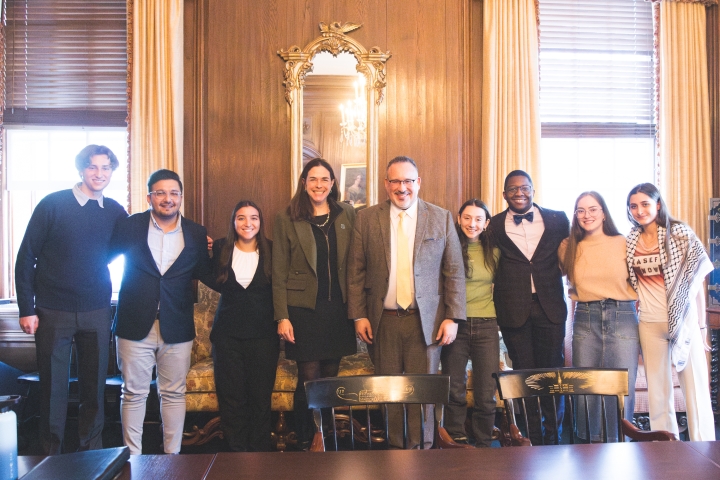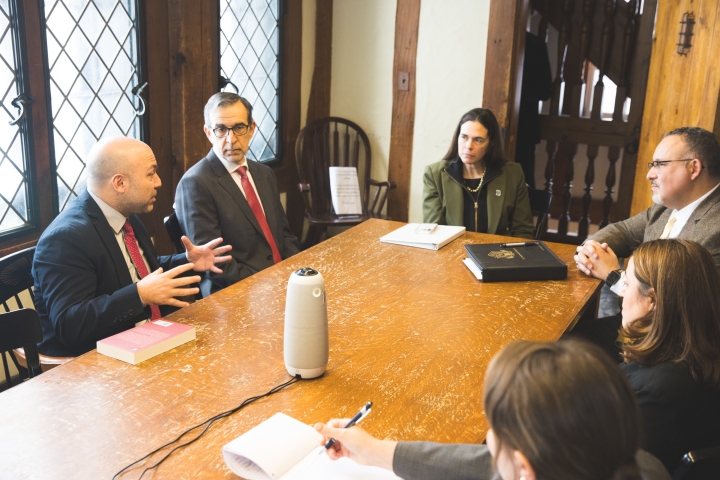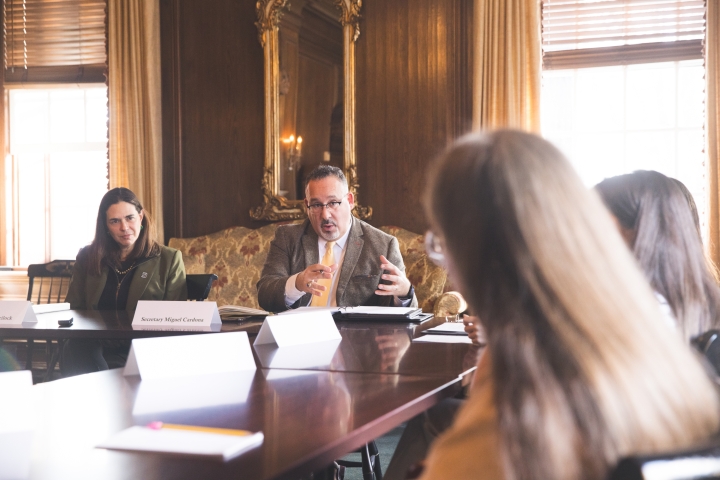Secretary of Education Miguel Cardona was on campus Wednesday for a roundtable discussion with President Sian Leah Beilock and students about how colleges and universities can foster open discourse in the context of polarizing events such as the Israel-Hamas war.
He also held a private conversation with President Beilock and faculty from the Middle Eastern Studies and Jewish Studies programs, who have received national attention for co-hosting a series of public forums designed to provide an intellectual framework for understanding the unfolding events in Israel and Gaza at a time of rising Islamophobia and antisemitism on many campuses.
Cardona called Dartmouth “an example of what I want to see across the country with students, administration, and professors working together to create an environment where freedom of speech is not only expected, but adds value to the education while maintaining a safe learning environment.”
Dartmouth Dialogues
Cardona’s visit came on the day the institution unveiled Dartmouth Dialogues, a university-wide commitment to promoting conversations that bridge political and personal divides.
One of the top priorities Beilock outlined in her Inaugural address, the initiative includes the Dialogue Project, which will expand training for students, faculty, and staff in the skills needed to successfully engage in such conversations; a partnership with StoryCorps that aims to reduce political polarization and build trust among participants from different backgrounds; a lecture series bringing expert guests to campus; and a webinar series on Middle East issues that will feature public servants, diplomats, and negotiators with direct experience in the region.
Beilock emphasized that the ability to engage in productive dialogue across difference is a skill that can be taught and learned.
“I’m a psychologist, and I believe you get these skills through training and practice. And that’s the power of a university. It provides opportunities to learn how to think, not what to think—that’s an important distinction—and to engage in and practice dialogue,” said Beilock, a noted cognitive scientist.
Beilock also connected the challenge of creating open dialogue on campus to the issue of mental health. “I don’t think we can talk about campuses in the wake of Oct. 7 without talking about the mental health crisis that is affecting young people across the country and the world,” she said.

In October, Dartmouth rolled out Commitment to Care, a strategic student mental health plan. “It was student-driven,” Beilock said. “Our students collaborated in coming up with and thinking about what we do.”
Listening to Students
Students participating in the afternoon roundtable, which took place in Sanborn House’s ornate Wren Room, included Yasmine Abouali ’26, Muhammad Faisal Azizi ’24, Jessica Chiriboga ’24, Anthony Fosu ’24, Samantha Lofman ’24, Cady Rancourt ’24, and Jackson Yassin ’26.
Cardona wanted to hear what Dartmouth had been doing right before Oct. 7 that made open discourse possible in its aftermath, and what lessons it and other institutions might learn from their experience.
The students cited Dartmouth’s scale, which allows individuals to know each other, as well as a culture in which students are actively engaged with faculty and administrators on issues relevant to them and have multiple platforms to make their voices heard.
Along with several of the students present, Azizi—a Middle Eastern studies and government major from Afghanistan—was taking the Politics of Israel and Palestine course co-taught by Visiting Professor Bernard Avishai and Senior Lecturer Ezzedine Fishere on Oct. 7.
“I’m Muslim, and there were students from Palestine, there was someone from Israel, someone who is Jewish American. But that was the calmest day in class,” Azizi said. “If you don’t know each other and there’s a gap, it’s easy for those gaps to be filled with grievances. So having opportunities for cultural exchange is very important. It’s the culture of this school, not just one thing we did in the past few months.”
Lofman, a major in earth sciences and government and a member of Chabad, spoke about the importance of intentionally articulating common values within groups where members hold a diversity of views.
“I’ve had very meaningful conversations with people at this table where you might expect us to disagree about everything,” said Lofman, who also took the Israel and Palestine course. “Yet we can find the common ground in our beliefs even when we disagree. We can find where we do stand together and see what we can learn from each other.”
Not surprisingly for a conversation about discourse across difference, not everyone agreed with how Dartmouth has managed the response to the Israel-Hamas war. Abouali, who is Palestinian Tunisian and was also in the Israel and Palestine class, took issue with how the institution reacted to protests and the lack of Palestinian voices at the public forums. “It’s the Dartmouth students that make this place special,” she said. “I appreciate the effort from the administration and leadership, but I do have to be honest.”
“It’s OK for us not to agree on everything,” Beilock said. “I’m proud that you’re able to speak your mind, and this is part of how we move forward together.”
Afterward, Fosu said attending the roundtable “meant the world” to him.
“I’ve studied education policy my entire time at Dartmouth, and here was an opportunity to actually put forth recommendations about policy to a policymaker, one of the chief in the nation, and also to talk about what matters to me on my campus, and hopefully have a good impact on the lives of students here and all over the nation.”
Rancourt agreed. “It’s exciting to see the federal government having sincere interest in what we’re doing here, in something we’ve dedicated ourselves to and that is so meaningful to college campuses in a time like this. I’m deeply grateful.”
Intentional Collaboration
Before his discussion with the students, Cardona and Katy Joseph, acting director of DOE’s Center for Faith-Based and Neighborhood Partnerships, met with Beilock and Tarek El-Ariss, professor and chair of Middle Eastern Studies; Fishere, a senior lecturer in Middle Eastern Studies and a best-selling Egyptian author, academic, and former diplomat who has written extensively on Israeli and Palestinian issues; and Susannah Heschel, the chair of Jewish Studies, who joined the conversation virtually from Berlin.

The three faculty members have long-standing affiliations with both Middle Eastern Studies and Jewish Studies, frequently co-teaching courses, co-sponsoring events, and collaborating on scholarship. El-Ariss emphasized that these preexisting relationships provided the trust needed for the two programs to work together in the aftermath of Oct. 7.
“There’s really a community ethos that extends beyond the classroom,” El-Ariss said. “We’re active within the classroom, but also at the level of the university, with other departments and programs and the different centers here on campus. So when Oct. 7 happened, there was already a community of people who talk to each other and trust each other, attend each other’s lectures, are in each other’s classrooms. We come from different academic and political viewpoints, but there was already something there, so it wasn’t something we had to invent on the spot to respond to the crisis.”
Heschel said backing of the administration was critical in the wake of Oct. 7. “Although we as faculty organized immediately, President Beilock also sent us a message asking if we would organize. In other words, we worked together. That support is extremely important. I think also the kindness and generosity with which faculty are treated at Dartmouth makes us want to work for the institution.”
Fishere said the collaborative environment cultivates “an atmosphere of academic freedom. People who teach Middle Eastern politics around the country complain about censorship, but the fact that we work together and have this trust actually enables us to have difficult conversations in the classroom with students without those conversations turning into polarization and antagonism.”
In December, Beilock participated in a Department of Education webinar hosted by Cardona on creating safe learning environments in the context of major disruptive events such as the Israel-Hamas war. Cardona said Beilock’s approach to leadership on these issues stood out.
“That leadership and willingness to say ‘this is an opportunity to help students’ really shone brightly that day, and it’s no surprise to me that Dartmouth is now being recognized nationally as an example of how it can be done.”
About Secretary Cardona
Cardona was sworn in as the 12th secretary of education in March 2021. A lifelong educator, he began his career teaching at the same elementary school in Meriden, Conn., that he attended as a boy. He went on to serve as an elementary school principal, leader of performance and evaluation, and assistant superintendent for teaching and learning for the Meriden public school system. He received the 2012 National Distinguished Principal Award for the State of Connecticut and the Outstanding Administrator Award from the University of Connecticut’s Neag School of Education. He holds a bachelor’s degree from Central Connecticut State University and earned his master’s and doctoral degrees and two advanced leadership certifications from UConn.
Cardona is one of several high-level government officials to visit Dartmouth in recent months. On Monday, U.S. Secretary of the Interior Deb Haaland was on campus to discuss Dartmouth’s commitment to Native American and Indigenous students. Last week, Beilock and faculty from Middle Eastern Studies briefed U.S. Sen. Jeanne Shaheen, D-N.H., and U.S. Rep. Becca Balint, D-Vt., on Dartmouth’s approach to facilitating discussion around the war between Israel and Hamas.
In November, Gen. Paul Nakasone, director of the National Security Agency and U.S. Cyber Command met with students and faculty in government and computer science. In September, U.S. Surgeon General Vivek Murthy and seven of his predecessors attended a historic Dartmouth panel on the national mental health crisis.
And political hopefuls and small-d democracy advocates—most recently former U.S. Rep. Liz Cheney, R-Wyo., and U.S. Rep. Jamie Raskin, D-Md.—have been making the rounds as the New Hampshire presidential primary heats up.
